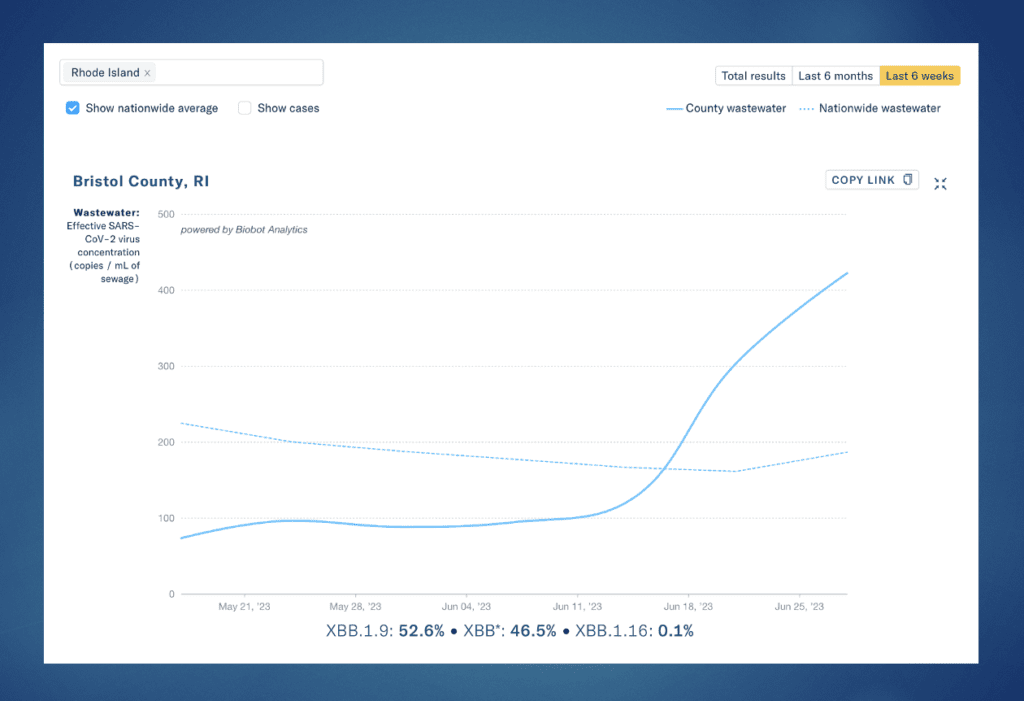Search Posts
Recent Posts
- GriefSpeak: Waiting for Dad – Mari Nardolillo Dias June 13, 2025
- Rhode Island Weather for June 13, 2025 – Jack Donnelly June 13, 2025
- Urgent call by Rhode Island Blood Center for Type O- and B- blood June 13, 2025
- Real Estate in RI: Ready, Set, Own. Pathway to Homeownership workshop June 13, 2025
- Outdoors in RI – Risky cattails, Fight the Bite mosquito report, 2A gun ban bill update June 13, 2025
Categories
Subscribe!
Thanks for subscribing! Please check your email for further instructions.

COVID wastewater levels increased sharply in Bristol Co. Extra caution for the safest 4th!
By Michael Fine and Nick Landekic
Bristol County, Rhode Island has shown a nearly 400% increase in the past two weeks
Editor’s Note: As we celebrate our Independence, let’s keep our own “independence” from COVID which has had us in its grasp for so long now, and enjoy this celebratory time – with caution. Over 98% of COVID deaths are now happening to those over 50. Older folk (over 50, especially over 60), and those with compromised immune systems, be of particular care and take precautions.
The SARS-CoV-2 COVID virus in wastewater has shown a sharp increase in Bristol County over the past two weeks. This could be an indicator of increased transmission and infection risk, and a reason to take greater precautions over the July 4th holiday weekend.
Many people assume that the pandemic is over and there is no further risk from COVID-19. But the COVID virus is still circulating and still causing over 700 deaths a week, more than 100 every day.
Most areas have stopped tracking and reporting on COVID cases levels. Now, we use a measure of the SARS-CoV-2 COVID virus in wastewater to gauge the spread of COVID-19. Many studies have shown that rising COVID in wastewater of a community generally means more people are infected in that area and are transmitting infection to others. Recent studies have demonstrated the ability to correlate COVID wastewater levels with infection levels, and the potential of using wastewater to guide public health actions.
Current national COVID wastewater levels are about 3 to 4 times higher than they were during the summers of 2021 or 2022, suggesting a lot of virus is now circulating.
Bristol County in Rhode Island has shown a nearly 400% increase in the past two weeks, from 94 viral copies/ml on June 7, 119/ml on June 14, to 422/ml on June 28. This has been one of the fastest increases and currently highest levels reported in the country.

Bristol, home of the first July 4th Parade in the nation is also home to nightly concerts for the two weeks leading up to July 4th, as well as other music venues and a carnival, all attended by large numbers of people.
Being outdoors is much safer and usually presents far less risk of COVID infection than indoors. However, it is not completely without risk. Especially when very large groups gather close together. Provincetown Massachusetts on Cape Cod experienced a major COVID outbreak in the summer of 2021, which is believed to have largely been spread outdoors by large numbers of people being close together.
This is a word to the wise… If you are going to the parade this year, we’d suggest being a little extra careful this year, given these latest data. Please consider making sure your COVID-19 booster is up to date (at least one in the last year, perhaps one in the last six months if you and your doctor agree) and wearing a N95 or equivalent mask if you are at increased risk from COVID – those over 50 and especially over 65, or immune compromised.
And have a safe and happy holiday!
___
Michael Fine MD, is an author, family physician, and the former director of the R.I. Department of Health; he lives in Scituate. Nick Landekic MA MBA, is a retired biotechnology CEO and entrepreneur who spent more than 35 years working in the pharmaceutical industry; he lives in Bristol. Both have written extensively on the subject of the COVID pandemic.
References for further information:
https://www.sciencedirect.com/science/article/pii/S0048969723012779
https://wwwnc.cdc.gov/eid/article/29/8/22-1580_article
https://www.sciencedirect.com/science/article/pii/S0048969722056662
https://www.ncbi.nlm.nih.gov/pmc/articles/PMC7879159/
https://www.sciencedirect.com/science/article/pii/S0043135422000331
https://www.frontiersin.org/articles/10.3389/fviro.2021.776998/full
https://www.ncbi.nlm.nih.gov/pmc/articles/PMC8282934/
https://www.pnas.org/doi/10.1073/pnas.2119600119
https://www.sciencedirect.com/science/article/pii/S0092867421014902
https://www.cdc.gov/mmwr/volumes/70/wr/mm7031e2.htm
https://www.wbur.org/news/2022/06/30/ptown-covid-outbreak-anniversary-lessons
